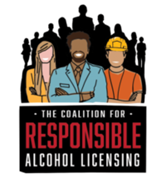NJ Hospitality Industry Joins Forces in Opposition to Governor's Call for Unlimited Liquor Licenses
FOR IMMEDIATE RELEASE Contact: Coalition for Responsible Alcohol Licensing
April 20, 2023 Diane Weiss 609-604-7989 info@njalcoholcoalition.com

NJ Hospitality Industry Joins forces in opposition to Governor Murphy's Call for Unlimited Liquor Licenses
Governor's reform would hurt State's largest industry while it is still recovering from pandemic restrictions
TRENTON, NJ –Just three years after Governor Phil Murphy’s pandemic shutdown caused widespread to New Jersey’s family-owned restaurants, bars and taverns, the Governor has brought forth a plan to further financially devastate thousands of small, family-owned businesses, eliminate local jobs, and endanger the public by flooding the State with an unlimited number of cheap liquor
licenses.
As a result of his irresponsible plan, the Coalition for Responsible Alcohol Licensing has been established to educate the Legislature about the significant issues facing the industry and to provide workable solutions based upon decades of experience and industry data.
In addition to the New Jersey Licensed Beverage Association and the New Jersey Restaurant and Hospitality Association, coalition members include the New Jersey Wine and Spirits Wholesalers Association and the Beer Wholesalers Association of New Jersey, with additional members expected to join.
“We cannot sit idly by while the Governor attempts to reduce our sweat equity and financial investments to nothing more than a scrap of paper to be picked up at town hall,” said Diane Weiss, Executive Director of the New Jersey Licensed Beverage Association (NJLBA). “We are committed to protecting the value and integrity of New Jersey liquor license holders”.
Dana Lancellotti, President and CEO of the New Jersey Restaurant and Hospitality Association, noted the industry continues to struggle in the wake of the Governor’s pandemic restrictions that shuttered numerous businesses that faced customer capacity restrictions for more than one year. The Administration’s plan, she said, would hurt the hardworking business owners who followed the rules while investing in a liquor license.
“The problem we can’t turn away from is those investments were already made, and those liquor licensees did exactly what they were required to do under a system created by the State,” Lancellotti said. “The Administration’s plan would immediately diminish the value of these licenses and would financially devastate many small business owners who are continuing to face issues stemming from the pandemic including workforce shortages and supply chain issues.”
The Coalition advocates for a measured approach to liquor license reform, which would emphasize activating the record-number of inactive licenses and permitting those licenses to be transferred between towns. Other solutions involve special licenses for municipalities with regional shopping malls, amending the thresholds for qualifying to the already existing, but never used “Smart Growth” license, and creating a program within the New Jersey Economic Development Authority to incentivize entrepreneurs and historically disadvantaged populations to enter into the industry.
“A good example of the misunderstanding people have of the availability of liquor licenses is the fact that there are currently over 200 inactive licenses in the towns governed by the Mayors who joined the Governor’s Mayors For Liquor License Reform Committee,” said Michael Halfacre, Executive Director of the Beer Wholesalers Association and a former mayor. “It would be so much more effective to get those existing licenses into business than to further hinder economic development by creating new licenses when they can’t even use the ones they have.”
Jeffrey Warsh, Executive Director of the New Jersey Wine and Spirits Wholesaler Association, said the Coalition leadership collectively brings nearly a century of experience to this issue.
"Restaurants, bars and taverns account for over $12 billion of New Jersey’s hospitality industry, and the New Jersey alcohol wholesalers who support them separately account for another $8 billion,” said Warsh. “The leadership of our coalition has nearly 100 years of experience in the alcoholic beverage industry, yet we have not been involved in any way with the Governor’s proposal. These mostly family-owned small businesses deserve better.”
The Coalition for Responsible Alcohol License Reform can be contacted at info@njalcoholcoalition.com
To learn more about the Coalition and its plan, visit www.njalcoholcoalition.com and follow the Coalition on Facebook by searching for NJ Alcohol Coalition.
###
